初一英语语法_时态专题复习
初中英语总复习语法时态句型易混淆解析所有知识点
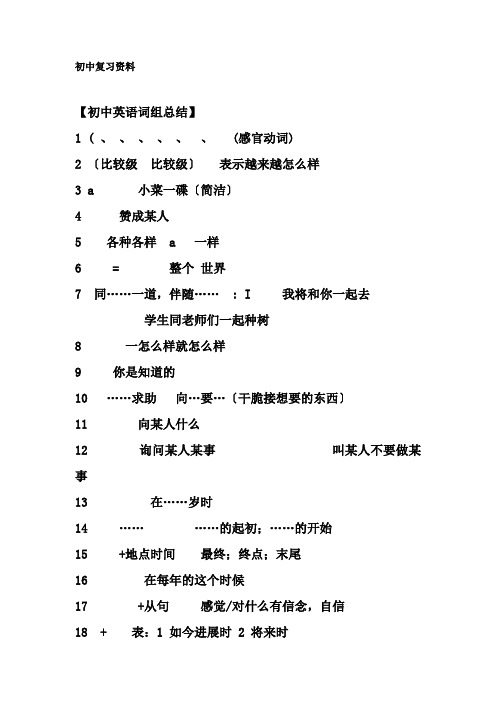
初中复习资料【初中英语词组总结】1 ( 、、、、、、 (感官动词)2 〔比较级比较级〕表示越来越怎么样3 a 小菜一碟〔简洁〕4 赞成某人5 各种各样 a 一样6 = 整个世界7 同……一道,伴随…… : I 我将和你一起去学生同老师们一起种树8 一怎么样就怎么样9 你是知道的10 ……求助向…要…〔干脆接想要的东西〕11 向某人什么12 询问某人某事叫某人不要做某事13 在……岁时14 …………的起初;……的开始15 +地点时间最终;终点;末尾16 在每年的这个时候17 +从句感觉/对什么有信念,自信18 + 表:1 如今进展时 2 将来时19 (+ v 原) = (+ v 原〕可以……21 ( 恐惊,胆怯……22 被允许做什么23 生某人的气24 () 为什么而生某人的气25 …原级…和什么一样 : 她和我一样高2627 远离28 从……分开29 对什么有害30 诞生于31 忙于做什么事忙于……32 注意;当心33 ……和什么不一样34 以……闻名35 对某人友好36 = 来自37 装满……的充溢 :38 从句39 + v(原〕将来时40 () = 在某方面善长, 擅长……41 对什么有好处42 很欢乐做某事43 对某人有好处44 身体安康45 处于困难中46 对某方面感爱好47 = 迟到 : 上课迟到48 像…… : I'm49 生某人的气50 由……制成(制成以后看不见原材料)51 由……制成(制成以后还看得见原材料)52 表不确定53 a 参观54 受某人欢迎55 宁静56 表**的缩写 : 陶陶豪杰57 生病在床58 : I596061 严于做某事62 对某人要求严格63 某方面对某人严格64 被要求干什么65 表确定66 对做某事有信念67 对做某事有信念68 对做某事有信念69 确定会做某事我们确定能学好英语70 + 名/动胆怯……71 胆怯做某事72 …和什么一样73 习惯做某事我爸爸习惯早74 值得做什么75 () 胆怯做某事胆怯某物丛句76 句子 +短语: a77 = 开始做某事…………以什么开始什么78 ……两者之间79 向……借…… ( 借给……什么东西80 = () = () 表一样81 打扰: I'm我特别愧疚打扰你,但是你能告知我怎么去车站82 到……为止83 :85 赶上某人86 和某人闲谈 + 地点带某人去某地87 进88 过来89 提出 : a 你能想出一个好方法吗?90 和某人沟通91 + 考虑做什么 : 为什么不考虑去泸州?92 随着……跳舞93 确定做某事94 a 做某方面的调查95 在……方面做得更好96 做错97 't 不要忘了做某事98 't /从句 /名词不要介意……99 +名〔单〕每一个… : 每一个学生都有一些书 100 101 喜爱102 从……逃跑103 期盼做某事104 摔下来从哪摔下来105 爱上什么106 离某地远107 发觉做某事怎么样108 发觉什么怎么样 : I109 完成〔名词〕110 = 合适某人111 没有做而忘了做了而又忘了112 ……从某某到某某 :113 做完,被〔别人〕做…: I 我理了发(头发被剪了〕汤母把他的坏牙拔掉了〔被牙医拔掉了〕114 a a115 = 及某人相处得好116 = 及某人相处117 = 为什么而打算118 给某人带来费事120 ……从某处得到某物121 a 做报告122 给某人某物123 钓鱼游泳124 去做下一件事接着做这件事125 远离从….分开126 上学〔用于专业的〕去学校〔不确定是上学〕127 好方法128 厌烦没做过的事厌烦做过的事129 a 举办谁的晚会130 a 听报告谈一谈131 如今完成进展时132 …( 地方〕……去过某过地方…〔地方〕去了某地还没回来133 玩得欢乐134 有什么事要做135 必需做某事136 () () 做什么事情有费事137 …138 …(时间)…放……假 139 听见某人做某事/正在做某事140 a 很大用处141 \'s 扶植某人某事〔某方面〕 () 扶植某人做某事142 渴望做某事143 () = ()144 = 你对什么的看法145 : 是否=: I 't () I 我不知道我是否应当去参与晚会 't () 他不知道我们明天早上是否能准时到达146 :假如,假设〔全部接一般时态〕+条件语态从句: I' 't 假设明天不下雨,我就去泸州假设他们要变更方案,他们会让我知道的I' I 假如我明年由足够的钱,我就要去英国147 's = 某人认为148 在某些方面149 = () 最终150 …什么在什么的北方〔北南西东〕151 在太阳下152 增加: ' 3% 他们把石油价增加了3% 153 +〔名〕代替: I'd a 我想要苹果,而不要梨子154 介绍某人给某人自我介绍155 邀请某人做某事156 做某人花掉某人多少时间: 5157 's 对某人来说做某事怎么样158 's 做某事怎么样159 's 对于某人来说怎么样 's 对某人来说太怎么样160 's ( ) 〔对某人来说〕做某事怎么样 's 对某人来说做某事太怎么样: 's161 's a 对……来说是个好办法162 's 对某人来说很重要 : 's163 's 's 到了该去做某事的时间: 's 's 该去上课了164 = 参与165 刚刚166 /介词短语让什么保持什么样?167 不让……进入168 让……保持……保持安康169 +名词表示:某物的钥匙或某题的答案170 ……可以是答题或钥匙171 …取笑……172 自学173 向某人学习174 学做某事175 让某人做某事176 让某人悲观: 't 我们不应当让我们的父母悲观177 :离某地远178 +大地方 +小地方居住在某地179 = 照看照看180 's 谁迷路181 a 确定做某事182 和谁成为挚友 : I183 把时间定的早一点184 让某人出洋相185 使什么成为什么 : I I 186 使某人〔某物〕怎么样 :187 使某人/某物怎么样188 让某人做某事189 (被动语态〕由……组成190 … …191 's 介意……做什么192 +名 +代193 +形容词194 确定195 +名词196 须要某人做某事197 (实义动词〕 (情态动词〕198199 +名词200 = 再也不…… : 't201 … (形、副〕 : 's 't202 …一点都不203 …表否认,也不 : I 't I 't , 我也没有姐姐204 …直到……才……205 / 给某人供应206 ( 供应什么东西给某人: I (I 我给你供应水207 's …在谁去那的路上208 一方面另一方面209 = 用交谈210 准时刚好211 ==一天,有一天212 +可数名词的复数形式213 一个到另一个214 一遍又一遍的 :215 兼职工作全职工作216 …付……钱开钱,付钱217218219220 =221 练习做某事222 相对……更喜爱…… : I 在物理和化学中,我更喜爱物理更情愿… : I 我不喜爱她不来223 装着去做什么从句: 这两个骗子装着努力工作224 …宁可……也不……: I a a 我愿肯当医生,也不当老师225 …把……当作…… I 我把你当作我的挚友 226 提示某人什么事提示某人做某事: ( 他提示我做饭227 使某人想起什么()228 还什么东西给某人229 对自己说230 对某人说231 花了多少钱在某事上232 花了多少时间陪谁233 () 花了多少时间做某事234235 看见某人做过某事看见某人正在做某事236 显得怎么样 :237 送给某人某物238 ……把什么寄到哪里去?239 使……震惊 : , 's ! a 啊,是你呀!吓我一跳240 向某人展示某物241 = 拿什么东西给某人看242 向某人展示某物243 ……一些……另一些……244 ……从……开始……从……开始245 远离……: ' 当我们参观时,我们要远离动物246 停下正在做的事247 阻挡某人做某事248 () 阻挡某人做某事249 停下正在做的事去做下一件事250 +名这样,这种251 合适某人252 使某人惊异 's 令某人惊异253 上课254 把某人带去 : I255 = a = a 漫步256 ①对谁说②和谁说③谈到④议论关于……257 和某人说话258 教某人做某事259 告知某人做某事261 告知某人某事丛句262 〔〕告知某人做什么263 ……区分264265 +名词()……266 …(名)……( )…一样267 =做某方面的方法+地方去哪的路e g268 …〔地点〕到哪的270 …………把什么翻译成什么 :271 和某人去旅游272 's 尽某人最大的努力去做某事: I273 想干什么,但没胜利想干什么,已经做过了274 …试衣服 a 试一下275 开小←→开大276 关上←→翻开拆开277 倒着278 …参观某个地方279 等某人【比较和】用来说明动作起始时间,用来说明动作持续时间长度。
初中七年级英语常用语法知识——动词时态经典复习题(答案解析)

一、选择题1.This pair of pants______gray. What color________your pants?A.are; are B.is;is C.is;are C解析:C【解析】【分析】【详解】句意:这条裤子是灰色的。
你的裤子是什么颜色的?考查be动词。
is是,一般用在主语是单数或者不可数名词之后;are是,一般用在可数名词复数之后。
根据题目中的pair来做题,当pants,shoes这类成双成对的词由pair来修饰时,谓语动词的单复数取决于pair的单复数。
根据第一个空格前的pair是单数,故第一个空格应该填单数is。
因为pants,shorts和glasses都是成双成对的出现,当做主语时,谓语动词用复数。
故第二个空格用are。
故选C。
2.I don’t have a baseball, but AlanA.do B.does C.have D.has B解析:B【解析】【详解】句意:我没有棒球,但是Alan有。
考查助动词。
do做,实意动词;也可以作助动词;does是do的第三人称单数形式;have 有,实意动词;has有,是have的第三人称单数形式。
句子的主语是Alan,第三人称单数形式,故先排除A和C。
does为助动词,代指上句话中的“have”。
D选项中has是及物动词,后面缺少宾语。
故选B。
3.A group of little ducks __________ their mother into the river and swim away.A.follow B.miss C.help D.cross A解析:A【解析】【详解】句意:一群小鸭子跟着它们的妈妈走到河里并游走了。
考查动词辨析。
follow跟随;miss想念,错过;help帮助;cross穿过。
一群小鸭子跟着它们的妈妈,follow表示跟随,故选A。
4.Our school basketball team ________ in the final of the basketball competition. Another team from No.5 Middle School ________ doing very well too.A.is; isn’t B.are; aren’t C.is; are D.are; is C解析:C【解析】【详解】句意:我们学校的篮球队在篮球比赛中进入了决赛。
初中英语五个时态专题练习和答案(复习可用)
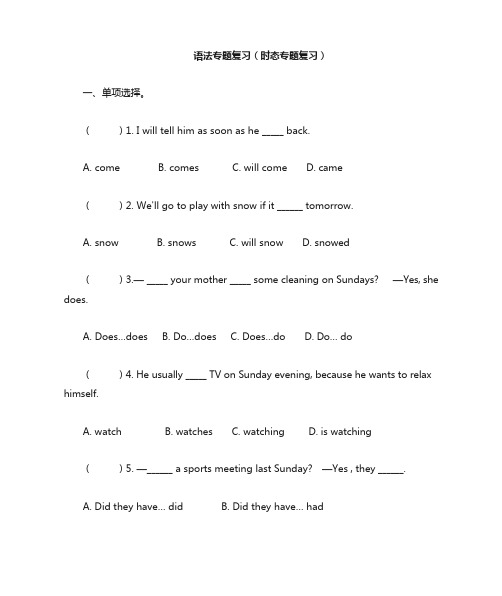
A. snow
B. snows
C. will snow D. snowed
( does.
)3.— _____ your mother _____ some cleaning on Sundays? —Yes, she
A. Does…does B. Do…does C. Does…do D. Do… do
( )11. You _____ me waiting for two hours. I _____ for you since five.
A. kept…waited
B. have kept…waited
C. kept…have waited D. have kept…have waited
( )12. —Where _____John _____?
6. We_________ (have) a good time in the Summer Palace last Sunday.
7. If it _________________ (not rain) tomorrow, we'll have a football match.
8. Don't forget _____________ (close) the window when you leave the room.
A. got to
B. reached C. arrive in D. reach
( )10. She ______ to school yesterday because of the strong wind and heavy rain.
A. goes B. went C. doesn’t go D. didn’t go
七年级时态总结
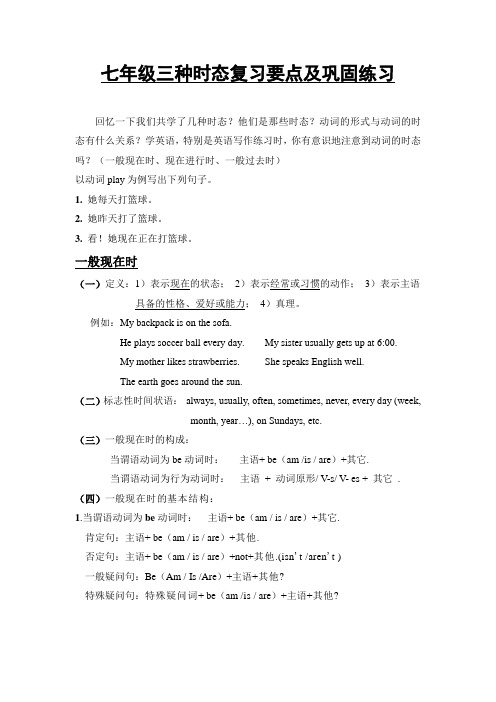
七年级三种时态复习要点及巩固练习回忆一下我们共学了几种时态?他们是那些时态?动词的形式与动词的时态有什么关系?学英语,特别是英语写作练习时,你有意识地注意到动词的时态吗?(一般现在时、现在进行时、一般过去时)以动词play为例写出下列句子。
1. 她每天打篮球。
2.她昨天打了篮球。
3. 看!她现在正在打篮球。
一般现在时(一)定义:1)表示现在的状态;2)表示经常或习惯的动作;3)表示主语具备的性格、爱好或能力;4)真理。
例如:My backpack is on the sofa.He plays soccer ball every day. My sister usually gets up at 6:00.My mother likes strawberries. She speaks English well.The earth goes around the sun.(二)标志性时间状语:always, usually, often, sometimes, never, every day (week,month, year…), on Sundays, etc.(三)一般现在时的构成:当谓语动词为be动词时:主语+ be(am /is / are)+其它.当谓语动词为行为动词时:主语+ 动词原形/ V-s/ V- es + 其它. (四)一般现在时的基本结构:1.当谓语动词为be动词时:主语+ be(am / is / are)+其它.肯定句:主语+ be(am / is / are)+其他.否定句:主语+ be(am / is / are)+not+其他.(isn't /aren't )一般疑问句:Be(Am / Is /Are)+主语+其他?特殊疑问句:特殊疑问词+ be(am /is / are)+主语+其他?2.当谓语动词为行为动词时:主语是第三人称单数时:肯定句:主语+动词的第三人称单数+其他. He likes apples .否定句:主语+doesn't+动词原形+其他. He doesn't like apples. 一般疑问句: Does+主语+动词原形+其他? Does he like apples?肯定回答: Yes,主语+does. Yes,he does.否定回答: No,主语+doesn't. No,he doesn't.特殊疑问句:特殊疑问词+一般疑问句? What does he like?3.当谓语动词为行为动词时:主语不是第三人称单数时:肯定句:主语+动词原形+其他 I have a pen.否定句:主语+don't+动词原形+其他 I don't have a pen.一般疑问句: Do+主语+动词原形+其他+? Do you have a pen?肯定回答: Yes,主语+do. Yes,I do.否定回答: No,主语+don't. No,I don't.特殊疑问句:特殊疑问词+一般疑问句? What do you have ?(五)动词的第三人称单数形式的变化规则(第三人称单数作主语时,谓语动词用三单形式)1.一般情况,在动词词尾加s;2.以字母s, x, ch, sh结尾的动词,加es;3.以辅音字母加y结尾的动词,先变y为i,再加es4.特殊:have has现在进行时(一)定义:表示现在(说话瞬间)正在进行或发生的动作,也可表示当前一段时间内的活动或现阶段正在进行。
初一英语上册【语法八大时态】知识点整理,月考复习必看
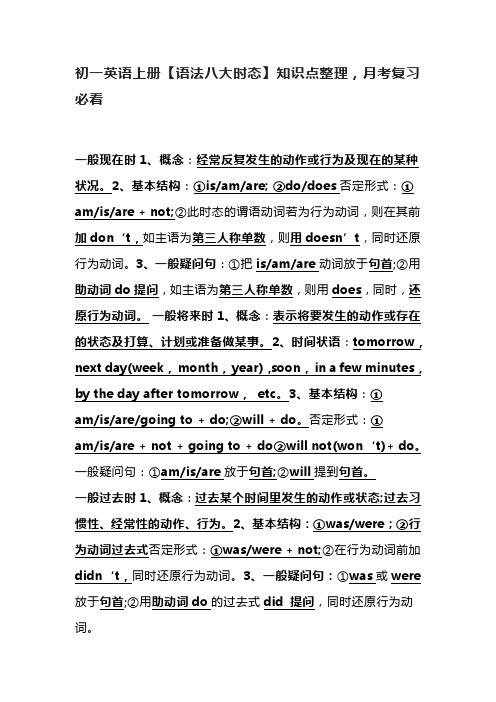
初一英语上册【语法八在时1、概念:经常反复发生的动作或行为及现在的某种状况。2、基本结构:①is/am/are; ②do/does否定形式:①am/is/are + not;②此时态的谓语动词若为行为动词,则在其前加don‘t,如主语为第三人称单数,则用doesn’t,同时还原行为动词。3、一般疑问句:①把is/am/are动词放于句首;②用助动词do提问,如主语为第三人称单数,则用does,同时,还原行为动词。一般将来时1、概念:表示将要发生的动作或存在的状态及打算、计划或准备做某事。2、时间状语:tomorrow, next day(week, month, year),soon, in a few minutes, by the day after tomorrow, etc。3、基本结构:①am/is/are/going to + do;②will + do。否定形式:①am/is/are + not + going to + do②will not(won‘t)+ do。一般疑问句:①am/is/are放于句首;②will提到句首。
过去将来时1、概念:立足于过去某一时刻,从过去看将来,常用于宾语从句中。2、时间状语:the next day(morning, year),the following month(week),etc。3、基本结构:①was/were/going to + do;②would + do。否定形式:①was/were/not + going to + do;②would + not + do。一般疑问句:①was或were放于句首;②would提到句首。
初中英语时态归纳总结
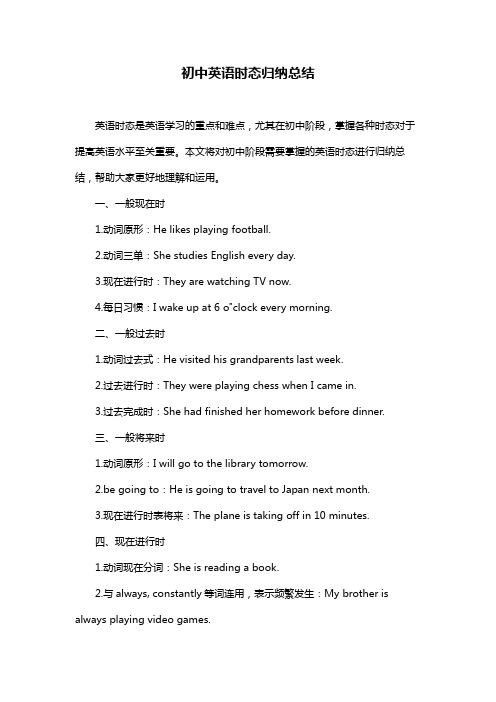
初中英语时态归纳总结英语时态是英语学习的重点和难点,尤其在初中阶段,掌握各种时态对于提高英语水平至关重要。
本文将对初中阶段需要掌握的英语时态进行归纳总结,帮助大家更好地理解和运用。
一、一般现在时1.动词原形:He likes playing football.2.动词三单:She studies English every day.3.现在进行时:They are watching TV now.4.每日习惯:I wake up at 6 o"clock every morning.二、一般过去时1.动词过去式:He visited his grandparents last week.2.过去进行时:They were playing chess when I came in.3.过去完成时:She had finished her homework before dinner.三、一般将来时1.动词原形:I will go to the library tomorrow.2.be going to:He is going to travel to Japan next month.3.现在进行时表将来:The plane is taking off in 10 minutes.四、现在进行时1.动词现在分词:She is reading a book.2.与always, constantly等词连用,表示频繁发生:My brother is always playing video games.五、过去进行时1.动词过去分词:They were discussing the project.2.与at that time, at this moment等词连用,表示在某个时间正在进行的动作:At that time, she was sleeping.六、完成时1.现在完成时:I have finished my homework.2.过去完成时:He had left the classroom before I arrived.七、被动语态1.一般现在时:The book is written by him.2.一般过去时:The window was broken by Tom.3.一般将来时:The letter will be sent to her tomorrow.总结:初中英语时态的学习需要掌握一般现在时、一般过去时、一般将来时、现在进行时、过去进行时、完成时和被动语态等。
初中英语语法专项复习英语动词时态和语态讲解和练习题
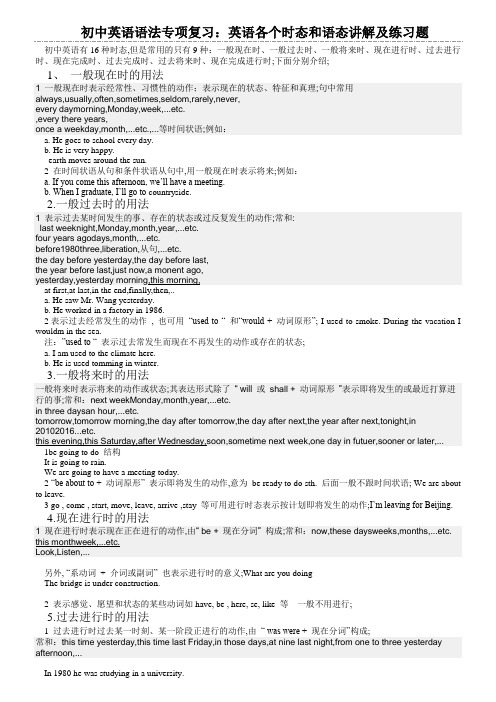
初中英语语法专项复习:英语各个时态和语态讲解及练习题初中英语有16种时态,但是常用的只有9种:一般现在时、一般过去时、一般将来时、现在进行时、过去进行时、现在完成时、过去完成时、过去将来时、现在完成进行时;下面分别介绍;1、一般现在时的用法1 一般现在时表示经常性、习惯性的动作;表示现在的状态、特征和真理;句中常用always,usually,often,sometimes,seldom,rarely,never,every daymorning,Monday,week,...etc.,every there years,once a weekday,month,...etc.,...等时间状语;例如:a. He goes to school every day.b. He is very happy.earth moves around the sun.2 在时间状语从句和条件状语从句中,用一般现在时表示将来;例如:a. If you come this afternoon, we’ll have a meeting.b. When I graduate, I’ll go to countryside.2.一般过去时的用法1 表示过去某时间发生的事、存在的状态或过反复发生的动作;常和:last weeknight,Monday,month,year,...etc.four years agodays,month,...etc.before1980three,liberation,从句,...etc.the day before yesterday,the day before last,the year before last,just now,a monent ago,yesterday,yesterday morning,this morning,at first,at last,in the end,finally,then,..a. He saw Mr. Wang yesterday.b. He worked in a factory in 1986.2表示过去经常发生的动作, 也可用“used to “ 和“would + 动词原形”; I used to smoke. During the vacation I wouldm in the sea.注:”used to “ 表示过去常发生而现在不再发生的动作或存在的状态;a. I am used to the climate here.b. He is used tomming in winter.3.一般将来时的用法一般将来时表示将来的动作或状态;其表达形式除了“ will 或shall + 动词原形”表示即将发生的或最近打算进行的事;常和:next weekMonday,month,year,...etc.in three daysan hour,...etc.tomorrow,tomorrow morning,the day after tomorrow,the day after next,the year after next,tonight,in 20102016...etc.this evening,this Saturday,after Wednesday,soon,sometime next week,one day in futuer,sooner or later,...1be going to do 结构It is going to rain.We are going to have a meeting today.2 “be about to + 动词原形” 表示即将发生的动作,意为be ready to do sth. 后面一般不跟时间状语; We are about to leave.3 go , come , start, move, leave, arrive ,stay 等可用进行时态表示按计划即将发生的动作;I’m leaving for Beijing.4.现在进行时的用法1 现在进行时表示现在正在进行的动作,由“ be + 现在分词” 构成;常和:now,these daysweeks,months,...etc. this monthweek,...etc.Look,Listen,...另外, “系动词+ 介词或副词” 也表示进行时的意义;What are you doingThe bridge is under construction.2 表示感觉、愿望和状态的某些动词如have, be , here, se, like 等一般不用进行;5.过去进行时的用法1 过去进行时过去某一时刻、某一阶段正进行的动作,由“ was were + 现在分词”构成;常和:this time yesterday,this time last Friday,in those days,at nine last night,from one to three yesterday afternoon,...In 1980 he was studying in a university.He was reading a novel when I came in.6.现在完成时的用法现在完成时由“have/has + 过去分词.其使用有两种情况:1 现在完成时所表示的动作在说话之前已完成,但对现在有影响;句中没有具体时间状语;常和:just,alreadly,yet,never,ever,now,before,this week,today,these days,once,twice,three times,...He has gone to Fuzhou.He has been to Fuzhou.2 现在完成时所表示的动作开始于过去,持续到现在,也许还会持续下去常用for 和since表示一段时间的状语或since then1949,last Monday,two o'clock,从句...,etc.,ever since then,for three daysa long time,two hours,...etc.so far , now, today, this wek month, year 等表示包括现在内的状语;He has studied English for 5 years.He has studied English since 1985.Now I have finished the work..注意:表示短暂时间动作的词如come, go , die, marry, buy 等的完成时不能与for, since 等表示一般时间的词连用;正确:I have bought the book already.错误:I have bought the book for two years.改:I have had the bookl for two years.7.过去完成时的用法1 过去完成时由“had + 过去分词”构成;过去完成时的动作表示过去某一时刻或某一时刻或某一动作之前完成的动作或状态;句中常用by then1977,yesterday,eight last night,the time we got there,...etc.by the end of last termweek,year,month,...etc..by, before, until, when 等词引导的时间状语;By the end of last year we had built five new houses.I had learnt 5000 words before I entered the university.2过去完成时的动词还可表示过去某一时刻之前发生的动作或状态持续到过去某个时间或持续下去;Before he slept, he had worked for 12 hours.8.过去将来时的用法过去将来时表示从过去的某个时间看来将要发生的动作或存在的状态;过去将来时由“should 或would + 动词原形” 构成;第一人称用should, 其他人称用would. ;常和:They were sure that they would succeed.二动词语态1.当句子的主语是动作的执行者时, 谓语的形式叫主动语态;句子的主语是动作承受者时,谓语的形式叫被动作语态;被动语态由助动词be + 过去分词构成,时态通过be 表现出来;1 一般现在时:You are required to do this.2 一般过去时:The story was told by her.3 一般将来时:The problem will be discussed tomorrow.4 现在进行时:The road is being widened.5 过去进行时:The new tool was being made.6 现在完成时:The novel has been read.7 过去完成时:He said that the work had been finished.8 过去将来时:He said that the trees would be planted soon.2. 一些特殊的被动结构1 带情态动词的被动结构:The problem must be solved soon.2 带不定式的被动结构:The room is going to be painted.The homework needs to be done with care.3 短语动词的被动:a.不及物动词+介词:若这类短语动词是及物性的,则可用于被动语态中,如:laugh at, look after, talk about, think of 等;若这类短语动词是不及物性的则不可用于被动语态中,如:book up, look down. 等b.及物动词+副词:bring about, carry out, find out, make out, put away, put off, take up, turn down, turn out, wipe out 等c. 动词+副词+介词:do away with, face up to, give into ,look down upon, make up with等d. 动词+名词+介词:catch sight of, keep on eye on, make a fool of , pay attention to , put an end to , set fire/light to , take notice of 等4 带复合宾语的动词在改为被动语态时,一般把主动结构中的宾语改为主语,宾语补足语保留在谓语后面;We always keep the classroom clean.比较:The classroom is always kept clean.5主动形式表示被动意义的词;常见的有:a.主动形式,这时动名词同句中的主语有动宾关系;The children need looking after.The windows wants /requires repairing.This point deserves mentioning.练习题1. It is a fine day. The sun __________shine brightly.2. They ___________visit the Science Museum next Sunday.3. Mr Brown________live in Beijing since he came to China.4. Mr Wang ________teach us English two years ago.5. The Smiths _______________ watch TV at this time last night.6. We __________learn about ten English songs by the end of last term.7. Father said that he ____________buy a new bike for me the next Friday.8. Bill isn¡¯t here. He ___________chat with his friends in the classroom.9. The teacher said that the moon __________go round the earth.10. The Young Pioneers will go to the zoo if it ____________not rain this Sunday.11. Listen They __________talk about the new film.12. Jim asked us what ___________happen in China in 1976.13. My mobile phone ___________steal on a bus last week.14. The host ____________interview the little boy just now.15. The Greens __________watch TV now.16. He said that he _____________ring me up when he got there.17. We ____________learn English for about three years.18. My brother_____________join the League in 1997.19. The farmers __________pick apples when I saw them.20. The red skirt __________cost the girl forty yuan.21. The film ____________begin when I got to the cinema.22. The girl told me that she wanted to be an English teacher when she _____grow up.23. My sister is a student and she _____________study at a middle school nearby.24. Mr Green __________travel to several places in South China since he came here.25. You _________catch the early bus if you get up early.26. _______you been________wear glasses all the time27. I’ll go home as soon as I _______finish my homework.29. Most science books are ______write in English.30. I ____________stay there for two months last year.31. Tell Lily to call me as soon as she _______.A. will arriveB. gets thereC. has goneD. reach here32. ----Hi, Kate. You look tired. What’s the matter ----I ______ well last night.A. didn’t sleepB. don’t sleepC. haven’t sleptD. won’t sleep33. ----Excuse me, look at the sign over there, please. Could you stop smoking----Sorry, I ____ that.A. didn’t seeB. don’t seeC. won’t seeD. can’t see34. ----Well, I found this. I think it must be yours. ----My watch Thank you. Where _____itA. do you findB. had you foundC. were you findingD. did you find35. ----Don you know when Dr White ____ for dinner this evening----No, but I think he ____ when he is free.A. will come; comesB. will come; will comeC. comes; comesD. comes; will come36. Look at those black clouds. It _____ rain. Let’s hurry. A. maybe B. would C. has D. is going to37. ----Jimmy is leaving for a holiday. ----Really Where ____ he ____A. has; goneB. will; goC. did; goD. does; go38. ----Shall we go shopping now ---Sorry, I can't. I ____ my shirts.A. washB. washesC. washedD. am washing39. ----I called you yesterday evening, but there was no answer.----Oh, I am sorry. I ___ dinner at my friend's home.A. haveB. hadC. was havingD. have had40. The Oriental Pearl TV Tower ____ thousands of visitors since 1995.A. attractedB. attractsC. has attractedD. will attract46. ----Why didn't you go to the cinema yesterday -----Because I ____ the film before.A. had seenB. have seenC. have watchedD. has watched47. I don't think John saw me. He ____ a book at that moment.A. just readB. has just readC. was just readingD. had just read48. Mr Smith ____ a book about China last year but I don't know whether he has finished it.A. has writtenB. wroteC. had writtenD. was writing49. Mr White ____ the newspaper while his daughter ____TV.A. has read; was watchingB. was reading; watchedC. was reading; was watchingD. reading; watched50. ---- I ____ you at the meeting. Why ----I was ill. A. saw B. have seen C. not see D. didn't see51. The 29th Olympic Games ____ in Beijing in 2008. A. hold B. will hold C. will be held D. held52. Hurry up The play ____ for ten minutes. A. has been on B. has begun C. had begun D. began53. ----May I speak to Mr Smith ----Sorry, he ____ Australia. But he ____ in two days.A. has been to; will come backB. has gone to; will be backC. has been in; would come backD. is leaving for; doesn't come back54. I can't go to the theater tonight because I ____ my ticket.A. have lostB. had lostC. will loseD. was losing55. ----What a nice bike How long ____ you ____ it ----Just two weeks.A. have; boughtB. did; buyC. have; hadD. are; having56. ----I'm sorry to have kept you waiting. ----Oh, not at all. I ____ here only for a few minutes.A. have comeB. had beenC. wasD. have been57. ----____ my dictionary anywhere ---- Yes. I saw it on your desk a moment ago.A. Did you seeB. If you seeC. Had you seenD. Would you see58. We were all surprised when he mad it clear that he ____ office soon.A. leavesB. would leaveC. will leaveD. had left答案:I. 1. shines/ is shining 2. are going to/ will visit 3. has lived 4. taught5. were watching6. had learned7. would buy8. is chatting9. goes 10.doesn't rain 11. are talking 12. happened 13. was stolen 14. interviewed15. are watching16. would ring 17. have learned 18. joined 19. were picking 20. cost21. had begun 22. grew 23. studies 24. has traveled 25. will catch26. Have; wearing 27. finish 28. haven't heard 29. written 30. stayedII. 31--35 BAADB 36--40 DBDCC 41--45 ACBAC 46--50 ACDCD51--55 CABAC 56--60 DABDA 61--65 BDBAB 66-70 BDABC 71--75 BCADD。
初中英语知识点时态总结
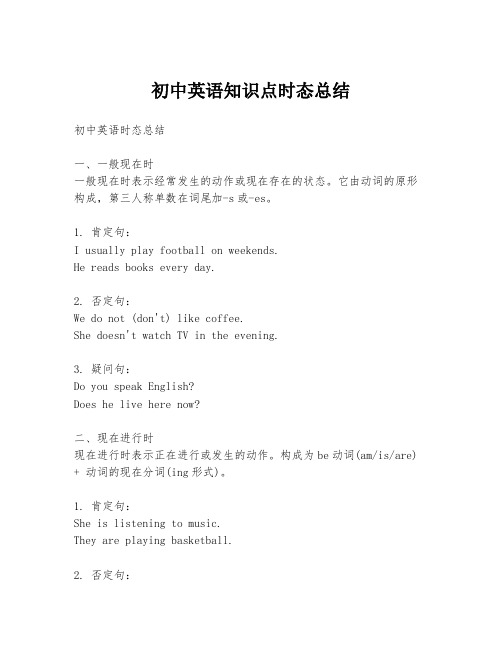
初中英语知识点时态总结初中英语时态总结一、一般现在时一般现在时表示经常发生的动作或现在存在的状态。
它由动词的原形构成,第三人称单数在词尾加-s或-es。
1. 肯定句:I usually play football on weekends.He reads books every day.2. 否定句:We do not (don't) like coffee.She doesn't watch TV in the evening.3. 疑问句:Do you speak English?Does he live here now?二、现在进行时现在进行时表示正在进行或发生的动作。
构成为be动词(am/is/are) + 动词的现在分词(ing形式)。
1. 肯定句:She is listening to music.They are playing basketball.2. 否定句:I am not (aren't) studying right now.The children are not (aren't) doing their homework.3. 疑问句:Is she cooking dinner?Are you waiting for someone?三、一般过去时一般过去时表示过去某个时间发生的动作或存在的状态。
规则动词在词尾加-ed,不规则动词则有特殊形式。
1. 肯定句:He walked to school yesterday.I visited my grandparents last week.2. 否定句:We did not (didn't) go to the cinema.She didn't buy anything at the store.3. 疑问句:Did you travel abroad last year?Did he finish his homework?四、过去进行时过去进行时表示过去某个时间点正在进行的动作。
- 1、下载文档前请自行甄别文档内容的完整性,平台不提供额外的编辑、内容补充、找答案等附加服务。
- 2、"仅部分预览"的文档,不可在线预览部分如存在完整性等问题,可反馈申请退款(可完整预览的文档不适用该条件!)。
- 3、如文档侵犯您的权益,请联系客服反馈,我们会尽快为您处理(人工客服工作时间:9:00-18:30)。
初一英语语法,时态专题复习一、一般现在时:(1、现在的状态。
2、经常或习惯性动作。
3、主语所具备的性格和水平。
4、真理。
1、标志:often(经常),usually(通常),sometimes(有时),always(总是),never(从不),on Sundays(在星期天)every day/month/year(每一天/月/年)2、结构:(1)主语+连系动词be(am/is/are)+名词/形容词/数词/介词短语/副词等做表语表状态(包括There be +n.)练习:1.I______(be) a student. My name_____(be) Tom.2. Where _____(be) my shoes? They___(be) here.3.Who ____(be) the girl with long straight hair? I think she ___(be) Kate.4. You and I ___(not be) in Class Six.5.___(be) there a supermarket on the Fifth Avenue? Yes, there_____(be).6. ____ her parent tall? No, he____.(2)主语(非第三人称单数)+行为动词原形+其他(用助动词do 协助构成否定句、一般疑问句和特殊疑问)(3)主语(第三人称单数)+行为动词的第三人称单数+其他(用助动词does 协助构成否定句、一般疑问句和特殊疑问句)行为动词第三人称单数加-s的形式1.- s 2. 辅音+y:study-studies 3.以s,x,ch,sh结尾watch-watches teach-teaches4特殊have-has do-does go-goes.1)His parents _______(watch) TV every night. 肯定句1) My brother _________(do) homework every day.2)His parents _________(not watch) every night.否定句2)My brother________(not do)homework every day.3)_____his parents_____(watch) TV every night?一般疑3)______ your brother _____ homework every day?Yes, they _______. No, they _______. Yes, he______. No, he _________.4)When___ his parents _____(watch) TV? 特疑4)When _____ your brother ____(do) homework?They watch TV every night. He does homework every day.二.现在实行时:表示说话瞬间或现阶段正在实行的动作。
1、标志:now(现在)listen(看)look(听)at the moment(此刻)2、结构:主语+助动词be(am/is/are)+行为动词的现在分词(doing)现在分词的构成:1.-ing:eat-eating,sing-singing 2.辅音字母+e:take-taking3. sit, put, begin, run, swim, stop, get, shop,get(双写最后一个辅音字母,再加ing.)4、特殊变化:lie-lying,die-dying 练习:1. Jim __________________(take) photos in the park now. 2. Jim_________(not take) in the park now. 3._______________Jim____________(take) photos in the park now? Yes, he _____. No, he _______.4. Where _________Jim ____________ photos now? In the park.1.我们正在吃晚餐。
2、我们每天6点起床。
We __________________________. We __________________ at six every day.3.你们在聊天吗?是的。
4、他们常常聊天吗?不是。
_______ they _______? Yes, they _____. ______ they often ______ ? No, they ________.5、他在做什么?他在做作业。
6、他晚上常干什么?他常做作业。
What ____he ___? He_______. What ___he usually ___ in the evening? He usually______.答案: 1.are having dinner 2. get up 3. Are , talking , are 4. Do , talk, don’t5. is doing, is doing homework6. does, do, does , homework综合练习:1.Mr Green _____(be) a worker. Now he ____(work) in the field. 2.Listen! Who_______(sing)?3.What time ____ your brother usually _____(do) his homework?4.You can_______(come) here by bus.5. Who ____(have) a ruler?6.Are they_____(clean) the room?7.-____ you____(eat) dinner? – Yes, we are.8.Jack ____(have) a soccer ball, but he ____(not have) a basketball. 9._______Jim _______(like)______(run)?10.They _____(be) from Canada. They______(not speak) Chinese. 11. He wants _________________(be) tall.三.一般过去时态:英语中表示过去某时发生的动作或情况的时态是一般过去时。
1、标志:yesterday(昨天)、two days ago…(两天前……)、last year…(去年…)、the other day(前几天)、once upon a time(很久以前)、just now(刚才)、in the old days(过去的日子里)、before liberation(解放前…)、WhenI was 8 years old(当我八岁时…)、at+一个时间点2.、表现形式:动词过去式(规则变化和不规则变化两种)3、规则变化:(1)一般情况+ed ,如pulled visit ed(2)以不发音e字母结尾的单词+d,如liked,dance d(3)以辅音字母+y结尾去y变i+ed,worried,studied(4)重读闭音节结尾的单词,末尾只有一个辅音字母双写词尾字母+ed,stopped,shopped4.不规则变化参考不规则动词表5、练习:He a student.他曾是一名学生。
否定句He a student.一般疑问句he a student?肯定回答, .否定回答, .They had a meeting last night. 他们昨晚开了一个会。
否定句They a meeting last night. 一般疑问句they a meeting last night?肯定回答, .否定回答, .提问: they last night?四.冠词:英语中冠词分为定冠词(the)、不定冠词(a/an)和零冠词(不用冠词)1.a用于辅音音素(不是辅音字母)前;an用于元音音素(不是元音字母)前。
如,An hour ago, an honest man accepted an honorable task In a university, a European and a one-eyed man walk along a one-way road with a usual tool. This isa usual thing.2.定冠词the的用法:定冠词the与指示代词this,that同源,有“那(这)个”的意思,但较弱,能够和一个名词连用,来表示某个或某些特定的人或东西。
(上文提到过的人或事;指世界上独一无二的事物;用在序数词和形容词最高级,形容词等前面;乐器的名词前;用在惯用语中;姓氏的复数名词之前表示一家人专有名词前等等)例如the sun,the rich 富人,on the second floor,the United States 美国play the piano,the Greens 格林一家人(或格林夫妇)in the day,在白天3.通常我们在三类名词前不带冠词:复数可数名词、不可数名词和专有名词。
但是,用来指特定的事物时,the能够出现在复数名词和不可数名词前面。
Girls like shopping when they are free. 女孩总是喜欢在空闲的时候购物Rice is very important to our country. China is a big country.1. He has already worked for ______ hour. A. the B. an C. a D. 不填2. Alice is fond of playing ______ piano. A. the B. an C. a D. 不填五.数词:基数词和序数词(一). 基数词.1.基数词的读法.1)1---12 :one two three four five six seven eight nine ten eleven twelve2)13---19:词尾加-teen :thirteen fourteen fifteen sixteen seventeen eighteen nineteen3)20,30,40,50,60,70,80,90 :逢十词尾加-ty :twenty thirty forty fifty sixty seventy eighty ninety4)21----99:在十位与个位之间加连字符构成.5)101---999 :先说几百, 再加and ,再加末尾两位数或个位数.101---one hundred and one 238----two hundred and thirty-eight(二). 序数词基数词变序数词,基数词变序数词口诀一二三,特殊记,结尾字母t,d,d; (first second third )八减t(eighth),九减e(ninth),f来把v e替(twelfth);ty变y为i e,然后再加th(twentieth);如果遇到遇到几十几,只变个位就能够(twenty-one---- twenty first)。
